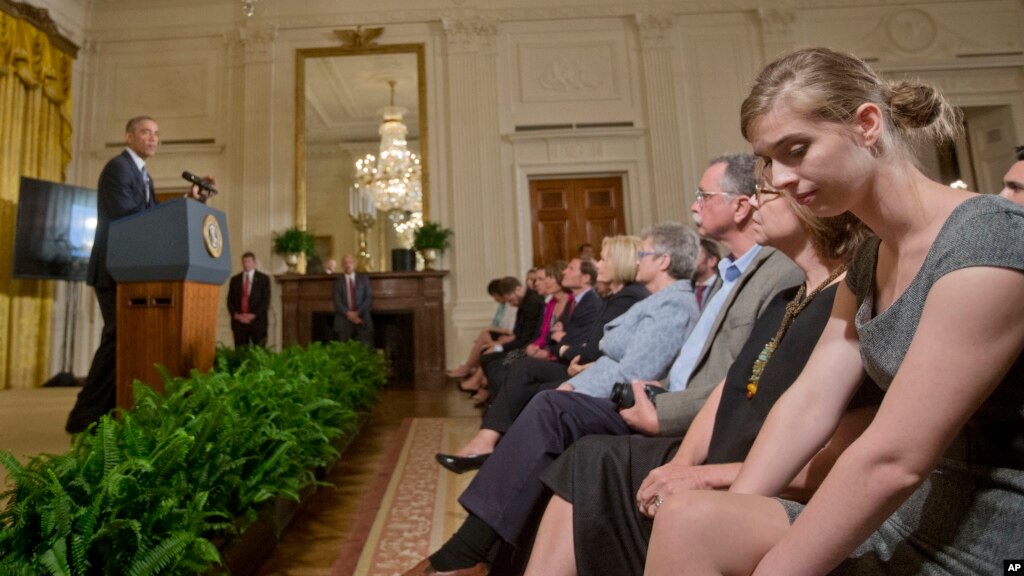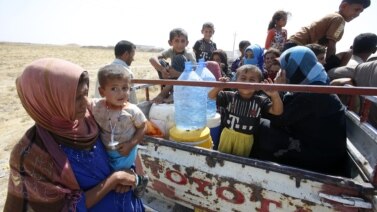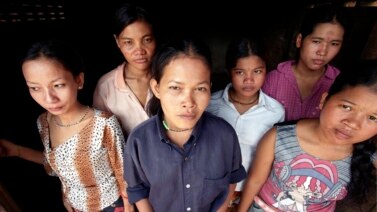
Sexual assault – sexual attack -- happens in countries all around the world. Recent news reports about gang rapes in India and sexual violence at universities have pushed the issue into intense public attention.
Many Americans are dealing with the problem. They are hearing and reading about the issue, from awareness and activism at colleges to programs to fight it at the highest levels of government.
Lindsay Aramayo is taking a self-defense class at a college just outside Washington.
“This class has been a great tool to me because I know what’s going on in the other campuses and I know that I can defend myself."
It’s easy to understand why young women want to learn self-defense skills.
A just-released study shows that women 18 to 24 had the highest rate of rape and sexual assault of females in all other age groups. The study by the U.S. Department of Justice was made between 1995 and 2013.
And many of those assaults are taking place at American colleges and universities.
Daniel Carter is an advocate for campus security. He says while self-defense is an important part of preventing sexual assault, it doesn’t deal with the root of the problem.
“We’ve got to change our culture of tolerating it, of allowing both stranger and acquaintance perpetrators to re-offend and having a society that allows it and looks the other way.”
Kassie Edwards also takes part in the self-defense class. She agrees.
In October of 2008, she was sexually assaulted at her university in Florida. She was working at the college library at the time.
“I had a truck of books, and I was getting ready to put them on the shelf and I noticed a man was on the same floor and he was in a hoodie. And I didn’t think anything of it and I went down the aisle to put the books on the shelf and then the man came from behind and he put me in a choke hold, and he brought me to the floor and that’s when he raped me.”
Kassie Edwards says she reported the assault to police, but her attacker was not caught. He went on to rape at least three other women before he was finally arrested and found guilty of the rapes --- and for the murder of his girlfriend.
Since she was attacked, Kassie Edwards has reached out to other rape victims.
“I think me talking helps other victims see that it’s not something that we should be ashamed of.”
Kassie Edwards has also worked with the Obama Administration campaign to end sexual violence on American campuses.
The campaign includes a Public Service Announcement featuring movie stars, musicians and politicians including the president.
“As far as we’ve come, the fact is that from sports leagues to pop culture to politics, our society still does not sufficiently value women. We still don’t condemn sexual assault as loudly as we should. We make excuses. We look the other way. The message that sends can have a chilling effect on our young women.”
As the issue of sexual assault continues to be discussed, the hope is that one day soon, women of all ages can walk the streets and campuses of America without fear.
I’m Bob Doughty.
This story came from VOA reporter Julie Taboh. Marsha James wrote it for VOA Learning English. Jeri Watson was the editor.
Words in This Story
awareness – n. knowledge that something (such as a situation, condition or problem) exists
assault - n. the crime of trying or threatening to hurt someone physically
self-defense – n. the act of defending yourself
advocate – n. a person who argues for or supports a cause or policy
perpetrator – n. the criminal
choke hold – v. a method of holding someone by putting your arm around the person’s neck with enough pressure to make breathing difficult or impossible

